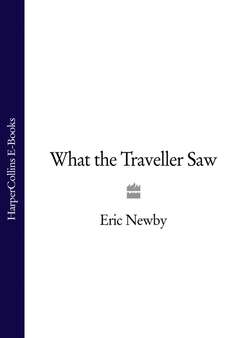Читать книгу What the Traveller Saw - Eric Newby - Страница 9
The Edge of the Western World IRELAND, 1960
Оглавление‘YOU MUST ASK the Captain but he’s not here,’ the old man said when we asked him if we could visit the house, but not brusquely as he would have done in England, and with no suggestion that he ought to be given something for being rooted out of his habitation late on a winter’s afternoon. He had emerged from a Gothick lodge so narrow that one wondered if he had to go to sleep standing up in it.
He unpadlocked and opened an iron gate, which sounded as if it had not been moved on its hinges since the discovery of oil, and admitted us to the ‘demesne’. Dusk was coming on. A long, seemingly endless ride between huge, shattered trees eventually led to a rather severe, late-eighteenth-century mansion with its façade intact, but which proved when we reached it to be nothing more than a shell. It had either been burnt, if so probably during the Troubles in the 1920s, or someone had taken the roof off to avoid paying taxes. It was at the time of the Troubles, we found out from the old man later, but alone with it in the gloaming there was no way of knowing. The Captain was away, somewhere across the water. And when in residence he lived in a bungalow.
Over the house rooks circled ceaselessly, below there was a lake full of reeds. To one side there was an artificial mound overgrown with impenetrable thorn, and an obelisk choked with ivy rose from it, like a huge tree trunk.
The whole place had an air of indescribable melancholy about it, but exercised an irresistible fascination for people such as myself, lovers of the abandoned and the decayed. In Ireland local authorities and developers have a habit of dynamiting these kinds of remains. But there still are hundreds, and perhaps, in spite of such uncontrolled demolitions, thousands of similar places; many of them with lodges from which old men emerge to unlock gates; and sometimes with invisible captains, Foulenoughs and Grimeses some of them, in the offing, for this was a country, as Waugh’s Captain Grimes said, where you couldn’t get into the soup however hard you tried.
It was the thought of all the people, many of them still alive, who had lived in Ireland but no longer did so, that gave the country its unique feeling of loneliness. Roads led from no place that was or could be signposted, to another, equally nameless, because there was nothing there to signpost. Here, out in the boondocks, women, many of them old, and children, walked long distances; the children to school, the women to weekly markets, there and back. Wherever we went we travelled with a Land Rover full of them, and heard some fine talk of a sort that had simply ceased to exist in modern Britain.
But in spite of this the past was too much for Ireland and its maddening, enchanting people, and sometimes for us, too. In it the ghosts of its past occupants cried out or whispered from empty castles, abandoned islands, hidden loughs, huge, precipitous cliffs (Croaghaun on Achill Island looms 2192 feet above the sea), burial mounds, caverns, towers, abbeys, churches, follies, waterfalls, holy wells, pasturing places, deserted villages; and from nineteenth-century barracks, middens on the edge of enormous sand beaches, from mountain tops and offshore rocks on which innumerable saints once lived in solitary contemplation.
